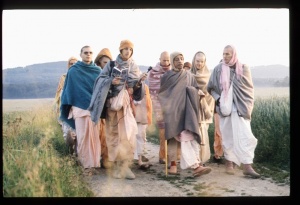CC Adi 10.60

A.C. Bhaktivedanta Swami Prabhupada
TEXT 60
- āsvādila e saba rasa sena śivānanda
- vistāri’ kahiba āge e-saba ānanda
SYNONYMS
āsvādila — tasted; e — these; saba — all; rasa — mellows; sena śivānanda — Śivānanda Sena; vistāri’ — describing vividly; kahiba — I shall speak; āge — later on; e-saba — all this; ānanda — transcendental bliss.
TRANSLATION
Śrīla Śivānanda Sena experienced the three features of sākṣāt, āveśa and āvirbhāva. Later I shall vividly describe this transcendentally blissful subject.
PURPORT
Śrīla Śivānanda Sena has been described by Śrīla Bhaktisiddhānta Sarasvatī Mahārāja as follows: “Śivānanda Sena was a resident of Kumārahaṭṭa, which is also known as Hālisahara, and was a great devotee of the Lord. About one and a half miles from Kumārahaṭṭa is another village, known as Kāṅcaḍāpāḍā, in which there are Gaura-Gopāla Deities installed by Śivānanda Sena, who also established a temple of Kṛṣṇarāya that is still existing. Śivānanda Sena was the father of Paramānanda Sena, who was also known as Purī dāsa or Kavi-karṇapūra. Paramānanda Sena wrote in his Gaura-gaṇoddeśa-dīpikā (176) that two of the gopīs of Vṛndāvana, whose former names were Vīrā and Dūtī, combined to become his father. Śrīla Śivānanda Sena guided all the devotees of Lord Caitanya who went from Bengal to Jagannātha Purī, and he personally bore all the expenses for their journey. This is described in the Caitanya-caritāmṛta, Madhya-līlā, Chapter Sixteen, verses 19 through 27. Śrīla Śivānanda Sena had three sons, named Caitanya dāsa, Rāmadāsa and Paramānanda. As mentioned above, this last son later became Kavi-karṇapūra and wrote the Gaura-gaṇoddeśa-dīpikā. His spiritual master was Śrīnātha Paṇḍita, who was Śivānanda Sena’s priest. Due to Vāsudeva Datta’s lavish spending, Śivānanda Sena was engaged to supervise his expenditures.”
Śrī Śivānanda Sena actually experienced Śrī Caitanya Mahāprabhu’s features of sākṣāt, āveśa and āvirbhāva. He once took along a dog while on his way to Jagannātha Purī, and it is described in the Antya-līlā, First Chapter, that this dog later attained salvation by his association. When Śrīla Raghunātha dāsa, who later became Raghunātha dāsa Gosvāmī, fled his paternal home to join Śrī Caitanya Mahāprabhu, his father wrote a letter to Śivānanda Sena to get information about him. Śivānanda Sena supplied him the details for which he asked, and later Raghunātha dāsa Gosvāmī’s father sent some servants and money to Śivānanda Sena to take care of Raghunātha dāsa Gosvāmī. Once Śrī Śivānanda Sena invited Lord Caitanya Mahāprabhu to his home and fed Him so sumptuously that the Lord felt indigestion and was somewhat sick. This became known to Śivānanda Sena’s eldest son, Caitanya dāsa, who gave the Lord the kinds of food that would help His digestion, and thus Lord Caitanya Mahāprabhu was very pleased. This is described in Antya-līlā, Tenth Chapter, verses 142 through 151.
Once while going to Jagannātha Purī, all the devotees had to stay underneath a tree, without the shelter of a house or even a shed, and Nityānanda Prabhu became very angry, as if He were greatly disturbed by hunger. Thus He cursed Śivānanda’s sons to die. Śivānanda’s wife was very much aggrieved at this, and she began to cry. She very seriously thought that since her sons had been cursed by Nityānanda Prabhu, certainly they would die. When Śivānanda later returned and saw his wife crying, he said, “Why are you crying? Let us all die if Śrī Nityānanda Prabhu desires.” When Śivānanda Sena returned and Śrīla Nityānanda Prabhu saw him, the Lord kicked him severely, complaining that He was very hungry, and asked why he had not arranged for His food. Such is the behavior of the Lord with His devotees. Śrīla Nityānanda Prabhu behaved like an ordinary hungry man, as if completely dependent on the arrangements of Śivānanda Sena.
A nephew of Śivānanda Sena’s named Śrīkānta left the company in protest of Nityānanda Prabhu’s curse and went directly to Śrī Caitanya Mahāprabhu at Jagannātha Purī, where the Lord pacified him. On that occasion, Lord Caitanya Mahāprabhu allowed His toe to be sucked by Purī dāsa, who was then a child. It is by the order of Caitanya Mahāprabhu that he could immediately compose Sanskrit verses. During the misunderstanding with Śivānanda’s family, Śrī Caitanya Mahāprabhu ordered His personal attendant, Govinda, to give them all the remnants of His food. This is described in Antya-līlā, Chapter Twelve, verse 53.